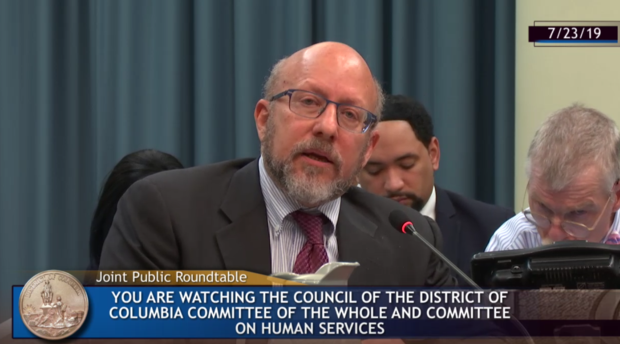Professor Robert Dinerstein Testifies at D.C. Hearing on Ending Disability Services Contract
July 29, 2019
On Tuesday, July 23, Professor and Director of American University Washington College of Law’s Disability Rights Law Clinic Robert Dinerstein testified at a D.C. Council hearing regarding the District’s transition efforts as it looks to end a program which provides a range of medical and social services for people with disabilities.

The District’s Department on Disability Services announced that it will end its current contract with the Georgetown University Center for Child and Human Development next month, moving the disability services currently offered in-house or replacing them through another contractor. During the hearing on the Developmental Disabilities Administration’s (DDA) Health Initiative Program Contract, Dinerstein said the actions of DDA in failing to renew the contract are “shortsighted and precipitous.”
“DDA’s failure to consult adequately with key stakeholders and to provide for a meaningful transition to taking over in-house the services Georgetown has provided for over 14 years puts at risk the health and medical needs of the District’s citizens with intellectual and developmental disabilities,” Dinerstein said during his testimony. “DDA’s actions amount to a ‘trust us’ approach. Sadly, the history of the District’s inadequate provision of services to people with intellectual and developmental disabilities—in particular, medical and health care services—does not warrant that kind of trust.”
Dinerstein echoed these sentiments in a recent Washington Post article, saying fears over the change are due to a broader worry that the D.C. government is not able to independently provide support for disabled residents. Along with the Center’s services, it also provided “another set of eyes and ears,” he said.
“In this long, 40-plus-years history of court involvement, I could understand why the agency and the District might want to say, ‘We don’t want people looking over our shoulders,’ ” Dinerstein told the Washington Post. “They’re kind of saying, ‘Trust us, we know what we’re doing.’ And I think what came out of the hearing is that there are a lot of people that have concerns about that.”
Dinerstein specializes in the fields of clinical education and disability law, especially mental disabilities law (including issues of consent/choice, capacity and alternatives to guardianship), the Americans with Disabilities Act, the UN Convention on the Rights of Persons with Disabilities, legal representation of clients with mental disabilities, and disability and international human rights. Prior to joining AUWCL, Dinerstein worked as an attorney in the U.S. Department of Justice's Civil Rights Division, Special Litigation Section, where he handled federal court cases on the rights of people in institutions for people with psychosocial disabilities, people with intellectual disabilities and juveniles. He has made numerous presentations on clinical legal education and disability law, among other topics, and has published a number of books, articles, chapters and other writing on these subjects. He is the co-author of A Guide to Consent (AAMR, 1999) and Lawyers and Clients: Critical Issues in Interviewing and Counseling (Thomson West 2009).